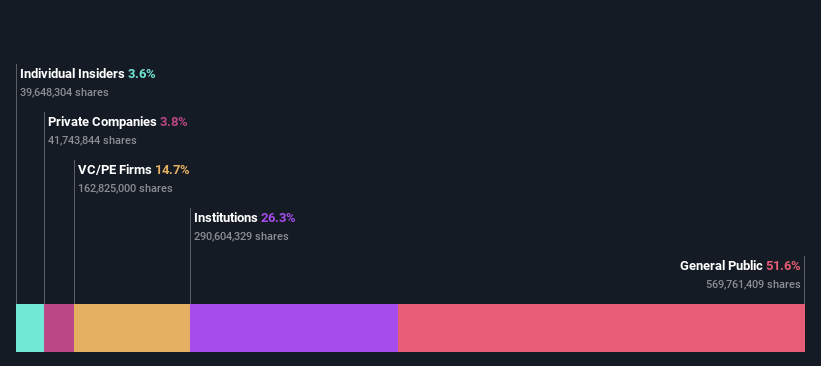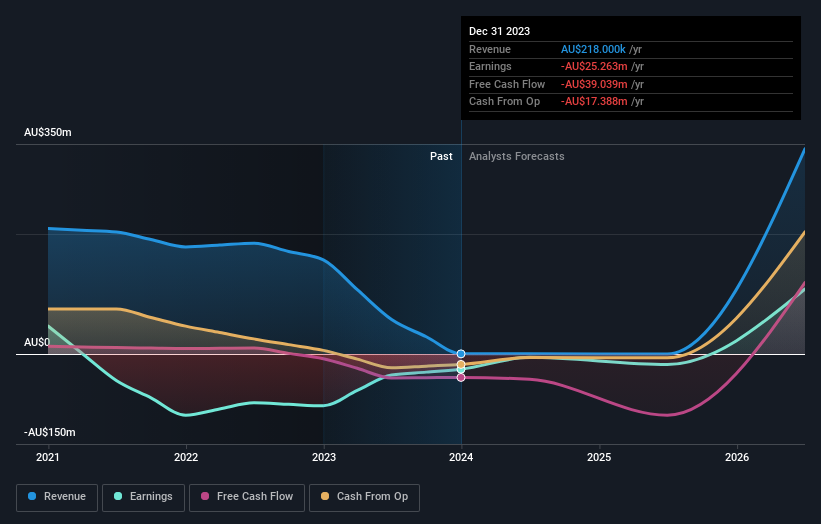Stock Analysis
- Australia
- /
- Metals and Mining
- /
- ASX:SPR
Institutions profited after Spartan Resources Limited's (ASX:SPR) market cap rose AU$116m last week but individual investors profited the most

Key Insights
- Spartan Resources' significant individual investors ownership suggests that the key decisions are influenced by shareholders from the larger public
- The top 25 shareholders own 48% of the company
- 26% of Spartan Resources is held by Institutions
Every investor in Spartan Resources Limited (ASX:SPR) should be aware of the most powerful shareholder groups. The group holding the most number of shares in the company, around 52% to be precise, is individual investors. That is, the group stands to benefit the most if the stock rises (or lose the most if there is a downturn).
While individual investors were the group that reaped the most benefits after last week’s 14% price gain, institutions also received a 26% cut.
Let's take a closer look to see what the different types of shareholders can tell us about Spartan Resources.
Check out our latest analysis for Spartan Resources

What Does The Institutional Ownership Tell Us About Spartan Resources?
Institutional investors commonly compare their own returns to the returns of a commonly followed index. So they generally do consider buying larger companies that are included in the relevant benchmark index.
We can see that Spartan Resources does have institutional investors; and they hold a good portion of the company's stock. This implies the analysts working for those institutions have looked at the stock and they like it. But just like anyone else, they could be wrong. If multiple institutions change their view on a stock at the same time, you could see the share price drop fast. It's therefore worth looking at Spartan Resources' earnings history below. Of course, the future is what really matters.

Hedge funds don't have many shares in Spartan Resources. Tembo Capital Management Limited is currently the company's largest shareholder with 15% of shares outstanding. With 6.2% and 4.9% of the shares outstanding respectively, 1832 Asset Management L.P. and Sparta AG are the second and third largest shareholders. Additionally, the company's CEO Simon Lawson directly holds 1.4% of the total shares outstanding.
On studying our ownership data, we found that 25 of the top shareholders collectively own less than 50% of the share register, implying that no single individual has a majority interest.
While studying institutional ownership for a company can add value to your research, it is also a good practice to research analyst recommendations to get a deeper understand of a stock's expected performance. There is some analyst coverage of the stock, but it could still become more well known, with time.
Insider Ownership Of Spartan Resources
The definition of company insiders can be subjective and does vary between jurisdictions. Our data reflects individual insiders, capturing board members at the very least. Company management run the business, but the CEO will answer to the board, even if he or she is a member of it.
Insider ownership is positive when it signals leadership are thinking like the true owners of the company. However, high insider ownership can also give immense power to a small group within the company. This can be negative in some circumstances.
We can report that insiders do own shares in Spartan Resources Limited. In their own names, insiders own AU$34m worth of stock in the AU$933m company. It is good to see some investment by insiders, but it might be worth checking if those insiders have been buying.
General Public Ownership
The general public, mostly comprising of individual investors, collectively holds 52% of Spartan Resources shares. This level of ownership gives investors from the wider public some power to sway key policy decisions such as board composition, executive compensation, and the dividend payout ratio.
Private Equity Ownership
With an ownership of 15%, private equity firms are in a position to play a role in shaping corporate strategy with a focus on value creation. Some investors might be encouraged by this, since private equity are sometimes able to encourage strategies that help the market see the value in the company. Alternatively, those holders might be exiting the investment after taking it public.
Private Company Ownership
It seems that Private Companies own 3.8%, of the Spartan Resources stock. It might be worth looking deeper into this. If related parties, such as insiders, have an interest in one of these private companies, that should be disclosed in the annual report. Private companies may also have a strategic interest in the company.
Next Steps:
It's always worth thinking about the different groups who own shares in a company. But to understand Spartan Resources better, we need to consider many other factors. Like risks, for instance. Every company has them, and we've spotted 2 warning signs for Spartan Resources (of which 1 makes us a bit uncomfortable!) you should know about.
Ultimately the future is most important. You can access this free report on analyst forecasts for the company.
NB: Figures in this article are calculated using data from the last twelve months, which refer to the 12-month period ending on the last date of the month the financial statement is dated. This may not be consistent with full year annual report figures.
Valuation is complex, but we're helping make it simple.
Find out whether Spartan Resources is potentially over or undervalued by checking out our comprehensive analysis, which includes fair value estimates, risks and warnings, dividends, insider transactions and financial health.
View the Free AnalysisHave feedback on this article? Concerned about the content? Get in touch with us directly. Alternatively, email editorial-team (at) simplywallst.com.
This article by Simply Wall St is general in nature. We provide commentary based on historical data and analyst forecasts only using an unbiased methodology and our articles are not intended to be financial advice. It does not constitute a recommendation to buy or sell any stock, and does not take account of your objectives, or your financial situation. We aim to bring you long-term focused analysis driven by fundamental data. Note that our analysis may not factor in the latest price-sensitive company announcements or qualitative material. Simply Wall St has no position in any stocks mentioned.
About ASX:SPR
Spartan Resources
Engages in the exploration, evaluation, and development of gold projects.
High growth potential with excellent balance sheet.

